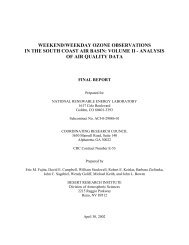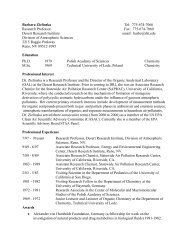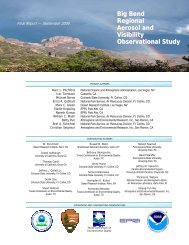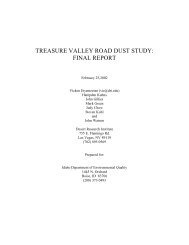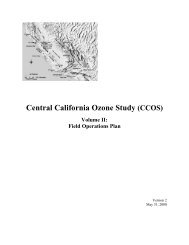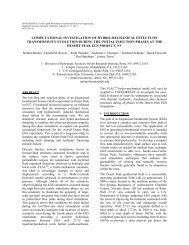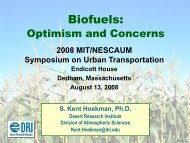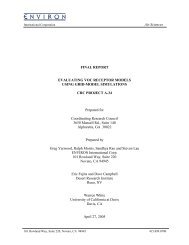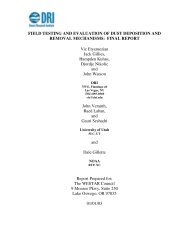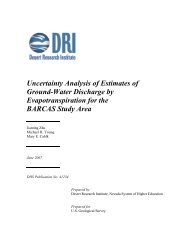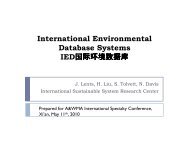Assessment of Conversion Technologies for Bioalcohol Fuel ...
Assessment of Conversion Technologies for Bioalcohol Fuel ...
Assessment of Conversion Technologies for Bioalcohol Fuel ...
You also want an ePaper? Increase the reach of your titles
YUMPU automatically turns print PDFs into web optimized ePapers that Google loves.
CATEGORY X–OTHER BIOLOGICAL PROCESSES<br />
Genotypes, Inc., Pacifica, Cali<strong>for</strong>nia<br />
Organizational Background–Genotypes, Inc. is a small Cali<strong>for</strong>nia firm founded in<br />
1992 as a contract research company to assist biotech/pharmaceutical companies<br />
with yeast strain improvement. Its principals are experienced biochemists with<br />
extensive backgrounds in the biotechnology industry. Since 1996, Genotypes has<br />
been pursuing development <strong>of</strong> a novel technology approach to producing ethanol from<br />
solar energy in shallow ponds employing specialty cultured organisms. The company<br />
has filed several patents on its technology, beginning in 1998, involving bioengineering<br />
the desired organism to photosynthetically produce ethanol in ponds.<br />
Technology Characteristics–The Genotypes technology, shown in Figure A21,<br />
involves use <strong>of</strong> a bioengineered photosynthetic (nitrogen-fixing) organism–<br />
cyanobacteria stabilized as organelles in yeast–to produce ethanol in one meterdeep<br />
ponds using only solar energy, water, atmospheric carbon dioxide and trace<br />
minerals. Biomass would be produced during the growth <strong>of</strong> the organism up to an<br />
appropriate density, then the biomass production would be essentially turned <strong>of</strong>f and<br />
replaced by direct conversion <strong>of</strong> photosynthetically produced sugars to ethanol. Thus<br />
the organism would produce its own biomass feedstock, resulting in no net carbon<br />
emissions since carbon dioxide taken up to produce sugars, which are directly<br />
converted to ethanol in the organism, would be released by burning the alcohol but<br />
then reabsorbed upon making more ethanol in the same organism. Genotypes<br />
estimates the potential ethanol yields from this process to be in the range <strong>of</strong> 37,000<br />
gallons per acre per year. This would translate, <strong>for</strong> example, into a land area<br />
requirement <strong>of</strong> about 670 square miles to produce the ethanol equivalent <strong>of</strong><br />
Cali<strong>for</strong>nia’s curent gasoline supply. Genotypes also estimates a potential ethanol<br />
production cost from its pond technology could eventually be as low as $0.33 per<br />
gallon.<br />
The advantages claimed <strong>for</strong> this unique technological approach are: 1) Scaleable–<br />
would use less than 1% <strong>of</strong> land that corn ethanol uses - could eventually be scaled to<br />
completely replace gasoline. 2) Cost effective: scaled-up projections <strong>of</strong> less than<br />
$1.00/gallon. 3) Carbon Neutral (no net carbon dioxide put in the air)–<br />
environmentally friendly. 4) Sustainable–will not run out <strong>of</strong> feedstocks: sunshine,<br />
carbon dioxide, and trace minerals. Also, the pond system is considered highly<br />
adaptable to desert-type climates and areas not well-suited <strong>for</strong> conventional<br />
agriculture or bioenergy crops.<br />
Development Status–Genotypes has conducted laboratory research aimed at<br />
developing the best photosynthetic organism <strong>for</strong> ethanol production at its <strong>for</strong>mer<br />
laboratory in South San Francisco. The laboratory was sold in 2000, and Genotypes<br />
continues to see partnerships with other developmental organizations and/or funding<br />
to carry on this development work. The company has delivered a number <strong>of</strong><br />
111



